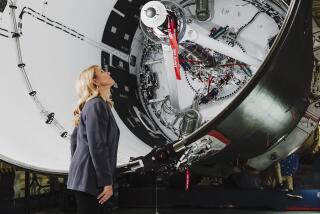A Rude Shock for Engineers of Dreams : They met the challenge of Sputnik and took America to the stars. Now they should make consumer goods?
For I dipp’d into the future,
Far as human eye could see;
Saw the Vision of the World,
And all the wonder that would be.
Saw the heav’ns fill with commerce,
Argosies of magic sails;
Pilots of the purple twilight,
Dropping down with costly bales.
-- Tennyson, “Locksley Hall “
I was 6 in 1957, the year that Sputnik was launched. I still remember hearing about the Soviet Union’s success on the car radio as my family drove to visit friends. I felt the national shock and humiliation that followed.
The beginning of the space race changed my life. The United States made science education a priority, and a call went out for young scientists and engineers to help restore our technological preeminence.
With thousands of others, I answered the call. I can’t claim that it was only the competition with the Soviets that shaped my career. I read so much science fiction that I exhausted the collection of the Enoch Pratt Free Library in Baltimore. Today, I sit at a desk, but then, I traveled the galaxy with Robert Heinlein and Isaac Asimov and E.E. “Doc” Smith. My mundane career today is something of a comedown.
By age 14, I knew I was going to be a propulsion engineer and help to develop the engines that lifted men into space. I was fascinated by the power of the giant engines that were, after all, the most important part of the rocket. I wanted to learn how to tame the bellowing forces that wanted to tear them apart--to make them obey our puny human will.
I studied hard and earned a bachelor’s degree in mechanical engineering from Cornell University and a master’s in aeronautics from Massachusetts Institute of Technology. I joined the aerospace industry too late to work on Mercury, Gemini, Apollo, or even the space shuttle.
Now, we’re pretending to be working on design studies for returning to the moon and, later, exploring Mars. I say “pretending,” because I suspect that, like me, my co-workers realize in their hearts that we shall never actually do these things.
It saddens me to realize that my country has lost its guts and vision, lost the spirit of adventure that took us to the moon. The fellow who will be the next vice president will probably try to outlaw space launches, since the rocket exhaust might damage the atmosphere and the astronauts might pollute the pristine environment of the moon.
Now the politicians suggest that, if we have a space program at all (it being an unnecessary luxury when we need to spend on socialized medicine and other politically correct causes), we should farm out the launch business to the Russians. Or buy rocket engines from them. After all, you can buy the services of 100 Russian engineers and scientists for a year for $90,000.
I believe that human beings will someday walk again on the moon, and will visit Mars and the other planets. But I am afraid that the spacecraft used by those brave men and women will be marked not with the Stars and Stripes but the Rising Sun.
I don’t begrudge the Japanese their chance. The United States has dropped the torch and forgotten about the “high frontier.” Now we are dismantling the aerospace industry, piece by piece, laying off the best and brightest who, with me, answered the call.
We hear a lot of talk about “conversion” of the industry to “domestic” purposes. Someone suggested that the rocket engine manufacturer I work for should learn to build electric cars. Or furnace burners, or something else that’s “practical.” I suppose so. But not me.
You see, I am a rocket propulsion engineer. I have traveled, in my imagination, to Dune and Down and Trantor. I’ve studied and worked my whole life to learn the technical disciplines needed to design rocket engines, which present some of the most challenging and difficult technical problems ever faced by human beings.
It may sound arrogant and elitist, and I suppose it is. But building electric cars is, well, beneath me. And it is beneath my colleagues. I did not work so hard to learn to design toy automobiles for bloodless environmentalists who have forgotten how to dream.
Our nation, it seems, has no need of dreams or dreamers. Our children now absorb predigested entertainment featuring mutant turtles. Reading is slowly becoming a lost art. And when children don’t read, their dreams are colorless and commonplace. We’ve convinced ourselves that we have no time, no energy, and certainly no money for dreams or for exploration. And we have already begun to pay the dreadful price exacted of those who cannot or will not dream.
I imagine a terrible, final judgment of our nation by some future historian. It is this:
“They built the means to begin the journey to the stars. They trained the people to develop the skills needed to do it. But they shrank back before the challenge, turned inward and thus began their decline.”
What will I do when they finally close the doors on my rocket factory? I don’t know. Maybe work on jet engines. Maybe design race cars. Maybe learn to speak Japanese. It appears that my country has no need of my services any longer. And I’m still just proud enough to think that reflects more poorly on my country than on me.
More to Read
Inside the business of entertainment
The Wide Shot brings you news, analysis and insights on everything from streaming wars to production — and what it all means for the future.
You may occasionally receive promotional content from the Los Angeles Times.










